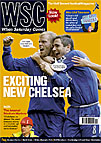 Adam Powley pays tribute to Tottenham's greatest-ever manager, Bill Nicholson
Adam Powley pays tribute to Tottenham's greatest-ever manager, Bill Nicholson
The death of an 85-year-old man, after a full and productive life punctuated with sporting success and unchallengeable achievement, is not a tragedy. Yet Bill Nicholson’s passing has been much lamented by Tottenham fans – understandably so, for the reaction to Nicholson’s life speaks volumes not only for the esteem in which he is held, but also for the way it symbolises the end of an era.
Amid the flood of tributes – many of which, gratifyingly, came from fans of other clubs, notably Tottenham’s staunchest London rivals – there was a tangible sense of loss; a realisation that a particular style of football management had come to an end.
Like Brian Clough who died in September, Nicholson was emblematic of another age, of which Alex Ferguson is probably the last disciple: the 24-hours-a-day gaffer, the scrupulous overseer of every aspect of the club’s operations. Legend has it that Nicholson was always first at White Hart Lane in the morning and last to leave at night. Modern managers may put in as many hours, but their domains are increasingly restricted to coaching and decreasingly concerned with man-management and financial negotiations.
By the year of his retirement as manager in 1974, frustrated by changing player attitudes, wary of a rapacious media and his heart broken by the hooliganism that blighted that year’s UEFA Cup final, Nicholson was already a man disenchanted with the times. In today’s modern football circus, he and his ilk would not last five minutes – and they probably wouldn’t want to, either.
But if this paints a picture of a grumpy old codger moaning about the modern world, it is at odds with his character. Nicholson was a much loved man as well as a great manager. Some obituaries and features were curiously grudging in their praise for his success, and the words “blunt” and “dour” appeared with as much regularity as “push and run” and “glory glory”. Yet such churlishness is at odds with what those who actually knew him say.
In latter years, at least, he was kindness personified; always willing to talk to the fans, always ready with a smile and a dignified, gentle disavowal of his own talents. It would be difficult to think of a greater contrast to José Mourinho and his bold assertions of self-proclaimed greatness.
Furthermore, Nicholson’s image as a man of the people rings true. His willingness to live for decades in the same terraced house just yards from the ground seems quaint now, but it reflected a genuine love for the club and the area. It was Nicholson who turned up for meetings organised by supporters’ groups protesting at the Sugar versus Venables conflict; Nicholson who appeared at AGMs of the plc, keeping his counsel but offering a mischievous smile as the accountants boasted of turnover and brand awareness. On the day of his death, one only had to see the staff and stewards at White Hart Lane to appreciate what he meant to the Tottenham people. Many of them live close by and they were in tears.
Thankfully, the club, which had treated him poorly at times in the past, recognised this, too. Often criticised for their frequently ham-fisted public relations, the current Spurs regime judged the mood just right. At the Bolton home game there was no over-arching sentimentality, just a restrained parade of former players and a filmed tribute on the big screens. The poignancy of seeing Nicholson’s Double side living up to Danny Blanchflower’s mantra – “the game is about glory” – to the musical accompaniment of Glory, Glory Hallelujah was achingly moving.
Spurs fans had long called for Nicholson to receive a knighthood. With typical modesty, the man himself stayed quiet on the subject, though the perfunctory official dismissal of the “Knight Bill Nick” campaign grated with those who resented others receiving the gong having achieved less, be it in sport, “public service” or business.
No matter. It is to be hoped that the high regard of the fans was more important to Bill than any devalued bauble. Supporters are fully aware of the legacy bequeathed by Nicholson to the club. Even those too young to remember his teams realise that he is the fundamental reason why Spurs, despite recent decline, have such a rich and successful heritage.
Before William Nicholson’s arrival at White Hart Lane as a 17-year-old in 1936, Tottenham had lifted two major trophies; after he turned up, 14 more found their way into the cabinet and the name Tottenham Hotspur became famous around the football world. Very few individuals come to embody their clubs, but Nicholson was one of those. Bill Nick was, and always will be, Tottenham.
From WSC 214 December 2004. What was happening this month